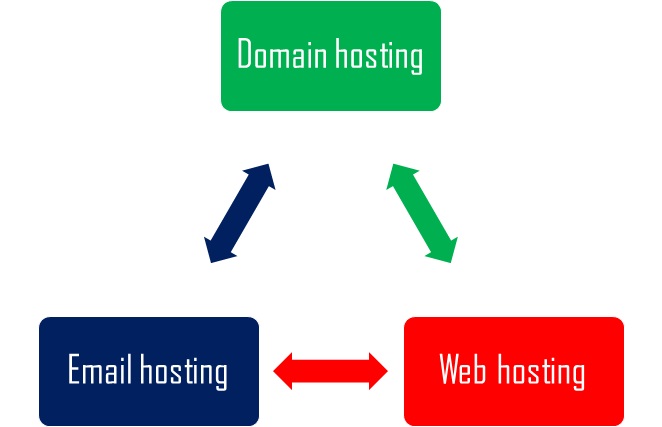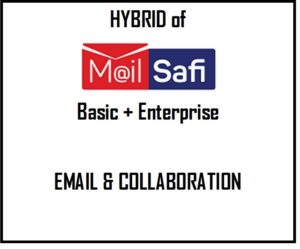Email hosting, web hosting, and domain hosting are essential constituents of conducting business in today’s increasingly digital and mobile world. They can both dictate how you interact with your employees and clients online.
Let’s take a closer look at what each of these services is and what makes them different.
1. What is Email Hosting?
Email hosting is a service where your email content is stored on a server. The email host hires out a server designed to handle all your email communication needs. It can either be the same server that’s hosting your website content or a server managed by another host. It can also be two different servers managed by the same hosting company.
Please note that common and free webmail sites such as Yahoo and Google are not examples of email hosting.
The key difference between email and web hosting is that with email hosting, you are hiring a server that does nothing more than host emails. Yes, nothing else! Just email! A business using this method for their emails must set up email addresses via a domain name. This way, it sends emails directly via the server itself rather than going through free webmail sites.
With email hosting, businesses will need to connect a registered domain name to their email servers. They can then use this to generate unique usernames for each user accessing the said server. For example, an employee of Kachooks Limited, may receive a unique address like peter.simba@kachooks.com, and the server will host all of the emails going to and coming from this email.
Unlike free webmail sites that cater to different users at a time, the email host usually provides a dedicated server. This means it operates solely for a set number of accounts. The resources within that server will only be reserved for a certain number of accounts.
In the event that a businesses’ requirements exceed the capacity of their current server, they can always scale up and have their emails stored on other servers.
Sign up for MailSafi email hosting for your business here.
2. What is Web Hosting?
Web hosting is a service that enables your website to live on the internet and be accessible via web browsers. Your website or web content is hosted on a server or computer for others to access it.
Think of it as a house where you store all your belongings, but instead of storing your TV, beds, furniture, and clothes, you store computer files – HTML, documents, images, and/or videos – in a web host.
Web hosting providers rent out their servers to store your website. They offer connectivity to their servers so that other users can access the files on your website.
Web hosting publishes a website online via a server. This differs fundamentally from email hosting in that it hosts media that can be accessed even by viewers who neither own the domain nor are they part of the domain.
Depending on their servers’ capabilities, a web hosting provider can cater to several sites at a time and multiple requests. Although some servers can manage only a certain number of requests due to their bandwidth limitations, this can often be scaled up depending on the service provider.
With web hosting, several websites can be hosted on a single server. These shared servers are the most basic units of web hosting.
As a business’s traffic and the number of requests grows, the business can choose to upgrade to servers that offer more bandwidth or to dedicated servers that host only their website.
Click to host your website with MailSafi.
3. What is Domain Hosting?
Domain hosting is a term that is loosely related to email and web hosting and therefore worth discussing for clarity. Your domain is the memorable name given to your website. For instance, a company Kachooks, may have a domain, kachooks.com. You register that name with a domain registrar, but you need domain hosting for that domain to be online. More often than not, you’ll get domain and web hosting in at the same time. Likewise, many businesses also choose to have their domain, email and web hosting to be met by one service provider.
If you would like to register your domain, you can do so on our domain registration page.
4. Summary
In a nutshell: web hosting involves storing website files (and sometimes emails) on one or more servers. Email hosting refers solely to email data storage.
In web hosting, the web host serves up webpages when someone types yourdomain.com into a web browser. In email hosting, the email host owns the server from which content is fetched when an email is sent to yourname@yourdomain.com.
They differ at the fundamental level that the former is about hosting your emails, while the latter your website. That said, both your emails and website can be hosted in one server or in two separate servers.
What happens behind the scenes is actually pretty straightforward.
A website, domain, and related email accounts are three separate entities that can live in different places.
Visit our website or contact us today for all your email hosting, domain hosting, or web hosting needs.
![]()





Pingback: Website hosting: Do I Need a Website for My Small Business? | MailSafi
Pingback: Is Your Business Still Using Gmail? Here's Why You Need to Upgrade to a Professional Email » The MailSafi Blog
Pingback: Is Your Business Still Using Gmail? Here's Why You Need to Upgrade to a Professional Email